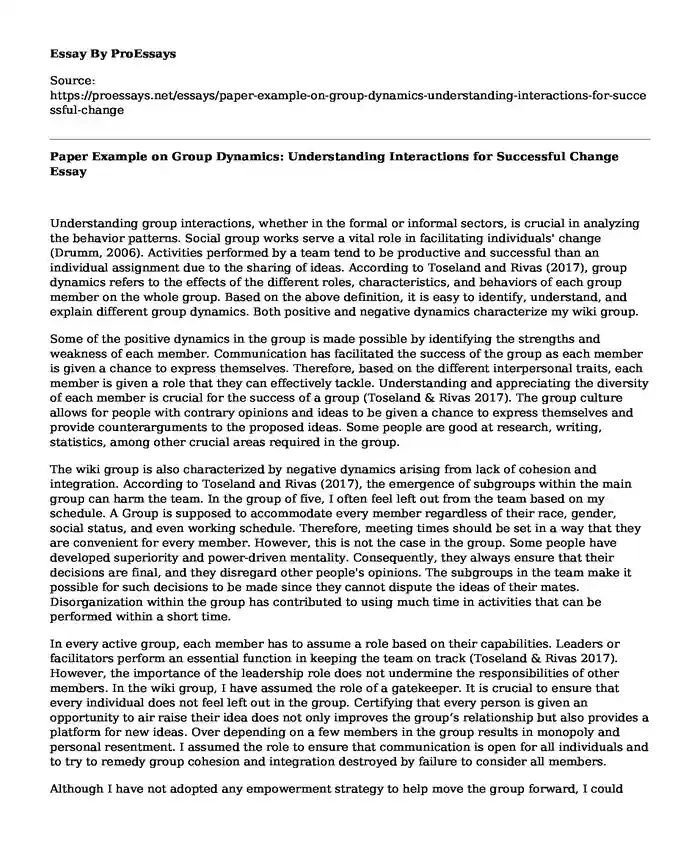Understanding group interactions, whether in the formal or informal sectors, is crucial in analyzing the behavior patterns. Social group works serve a vital role in facilitating individuals' change (Drumm, 2006). Activities performed by a team tend to be productive and successful than an individual assignment due to the sharing of ideas. According to Toseland and Rivas (2017), group dynamics refers to the effects of the different roles, characteristics, and behaviors of each group member on the whole group. Based on the above definition, it is easy to identify, understand, and explain different group dynamics. Both positive and negative dynamics characterize my wiki group.
Some of the positive dynamics in the group is made possible by identifying the strengths and weakness of each member. Communication has facilitated the success of the group as each member is given a chance to express themselves. Therefore, based on the different interpersonal traits, each member is given a role that they can effectively tackle. Understanding and appreciating the diversity of each member is crucial for the success of a group (Toseland & Rivas 2017). The group culture allows for people with contrary opinions and ideas to be given a chance to express themselves and provide counterarguments to the proposed ideas. Some people are good at research, writing, statistics, among other crucial areas required in the group.
The wiki group is also characterized by negative dynamics arising from lack of cohesion and integration. According to Toseland and Rivas (2017), the emergence of subgroups within the main group can harm the team. In the group of five, I often feel left out from the team based on my schedule. A Group is supposed to accommodate every member regardless of their race, gender, social status, and even working schedule. Therefore, meeting times should be set in a way that they are convenient for every member. However, this is not the case in the group. Some people have developed superiority and power-driven mentality. Consequently, they always ensure that their decisions are final, and they disregard other people's opinions. The subgroups in the team make it possible for such decisions to be made since they cannot dispute the ideas of their mates. Disorganization within the group has contributed to using much time in activities that can be performed within a short time.
In every active group, each member has to assume a role based on their capabilities. Leaders or facilitators perform an essential function in keeping the team on track (Toseland & Rivas 2017). However, the importance of the leadership role does not undermine the responsibilities of other members. In the wiki group, I have assumed the role of a gatekeeper. It is crucial to ensure that every individual does not feel left out in the group. Certifying that every person is given an opportunity to air raise their idea does not only improves the group’s relationship but also provides a platform for new ideas. Over depending on a few members in the group results in monopoly and personal resentment. I assumed the role to ensure that communication is open for all individuals and to try to remedy group cohesion and integration destroyed by failure to consider all members.
Although I have not adopted any empowerment strategy to help move the group forward, I could implement an equality strategy. An empowerment strategy refers to a set of actions utilized to help marginalized groups present their ideas. Equality as a strategy in group work refers to providing an equal platform for each member and making them feel appreciated. Considering every individual when setting group meeting times, listening to people's views on a topic, and avoiding negative criticism ensures that every person within the group does not feel out of place. When a person has a sense of belonging, they attain one of the highest needs in Abraham Maslow's hierarchy of needs.
References
Drumm, K. (2006). The essential power of group work. Social Work with Groups, 29(2-3), 17-31.
Toseland, R. W., & Rivas, R. F. (2017). An introduction to group work practice (8th ed.). Boston, MA: Pearson.
Cite this page
Paper Example on Group Dynamics: Understanding Interactions for Successful Change. (2023, Sep 25). Retrieved from https://proessays.net/essays/paper-example-on-group-dynamics-understanding-interactions-for-successful-change
If you are the original author of this essay and no longer wish to have it published on the ProEssays website, please click below to request its removal:
- Net Neutrality and Social Media: What the Impact of the Recent Ruling From the FCC Could Mean
- The Role of Media in Perpetuating Racial, Cultural and Gender Stereotypes Essay
- Essay Sample on Parent Disciplining Children
- Essay Sample on Cultural Taboos
- Essay on Resolve Workplace Conflicts Before They Escalate: Tips for Mediation
- Paper Example on Boston Massacre: Deadly Riots That Shaped US Independence
- Essay Sample on Live Longer, Age Well: Essential for Sustainable Quality of Life







